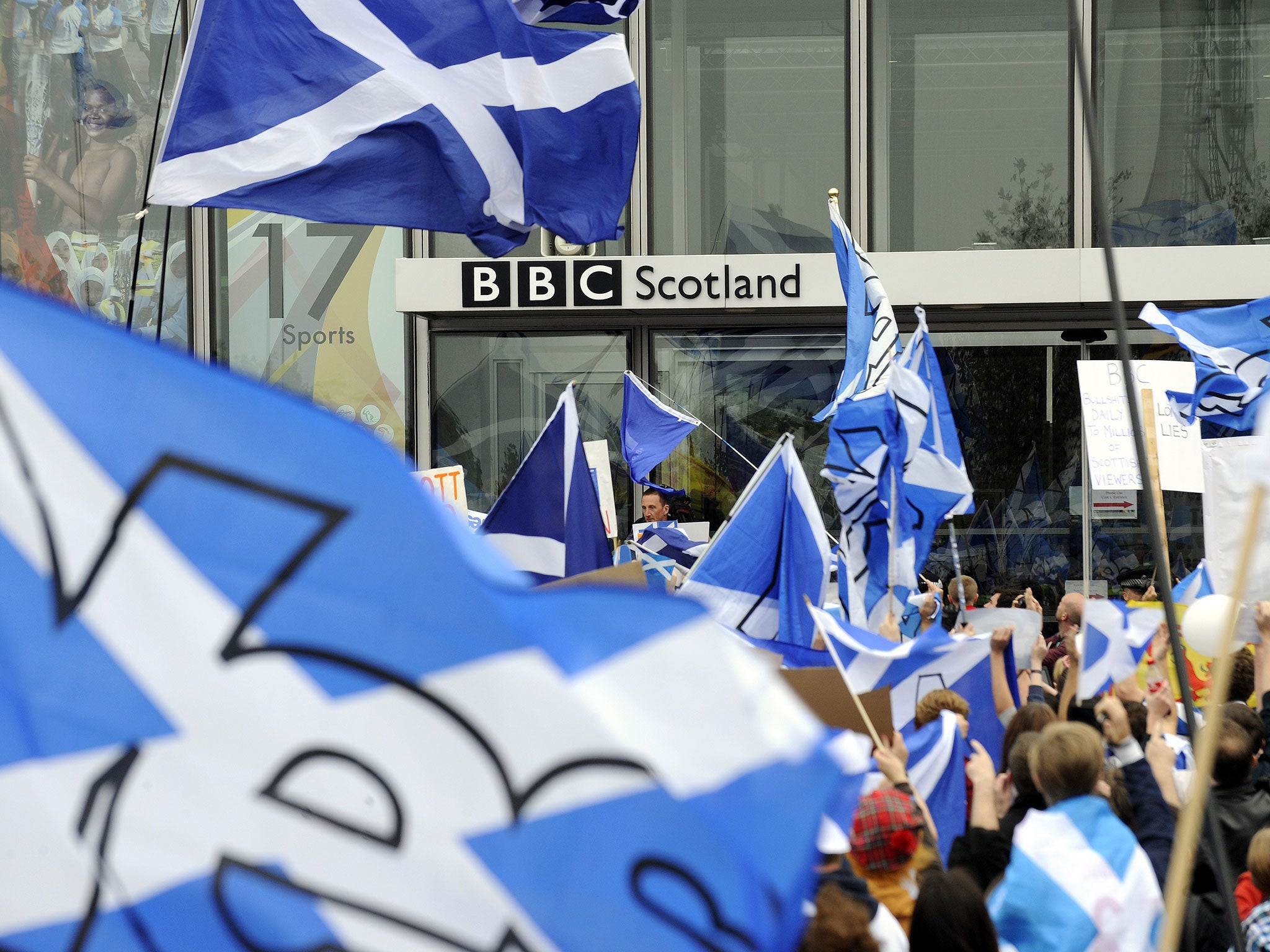Scottish independence: BBC Scotland's referendum coverage 'institutionally biased', Alex Salmond claims
BBC is spreading 'propaganda' to save Union, say protesters

Thousands of angry nationalists surrounded the BBC’s Scottish headquarters in Glasgow accusing the corporation and its political editor, Nick Robinson, of broadcasting “lies” and being “biased” in favour of retaining the Union.
The protest was mounted amid claims that the BBC is institutionally biased against Scottish independence and has been spreading “propaganda” to keep the Union intact through its news reports.
In scenes likened by one commentator to Vladimir Putin’s censorship of the media in Russia, Yes supporters waved Scottish flags, banners and placards, branding the BBC the “British Brainwashing Corporation”, demanding the sacking of “Liar Robinson” and claiming the annual TV licence was a “licence to lie”.
The demonstrators’ anger centred on two events: an alleged failure of the BBC to broadcast the true scale of a Yes rally in Glasgow on Saturday; and accusations that Mr Robinson had connived with the Treasury to spread lies about the dangers to business and financial services of an independent Scotland.
The crowd chanted “BBC – shame on you” as hundreds of police surrounded the main entrance to the building in Pacific Quay. “Come next week – we’ll clear out this building and put in our people,” shouted one demonstrator. Another accused the BBC of being part of “corrupt” polls that “failed to show the true scale of the Yes support”.
Police numbers increased steadily throughout the day. The weekend staff inside BBC Scotland was low, but those attending work were told to keep away from the windows.
Those leading the demonstration denied that it had been co-ordinated by the Yes campaign. One group said that in the event of a No vote on Thursday, “We will take to the streets. We will not be robbed of victory by a conspiracy which has the BBC at its centre.”
Alastair Campbell, Tony Blair’s former director of communications, said the demonstration may amount to media censorship. “Had my run ins with BBC, but organised protests like the one going on now is beyond Tebbit, and not far off Putin. Vote YES for intimidation,” he wrote on Twitter.
Alex Salmond, Scotland’s First Minister, said in an interview published on Sunday that the corporation was unconsciously slanting its coverage in favour of the Better Together campaign because its London-based journalists “don’t realise they’re biased”.
The SNP leader was speaking to Scotland’s Sunday Herald newspaper shortly after a press conference on Thursday in which he had accused the BBC’s political editor Nick Robinson of “heckling” him.
Asked if the BBC’s coverage of the referendum had been biased, he replied: “Yes, absolutely. Of course it is. The problem with Nick…I mean, don’t get me wrong, I like these folk, but they don’t realise they’re biased. It’s the unconscious bias which is the most extraordinary thing of all.
“If the BBC were covering, in my estimation, any referendum, in any democracy, anywhere in the world, they would cover it impeccably, in a balanced fashion. What they don’t understand is they’re players in this.”
Mr Salmond added that the BBC’s correspondents who are usually based in the South East had displayed ignorance about the referendum, reacting to old news as if it was new.
“The coverage of the last few days, for example, the whipped up metropolitan media coverage, ‘My God, Bob Dudley [BP’s chief executive] has commented! Standard Life has issued a statement!’ For the metropolitan BBC journalists this is extraordinary news,” he said.
“I’m not really laying this charge at BBC Scotland. I just think metropolitan BBC has found this whole thing extraordinarily difficult, to separate their own view of the world from their view reporting Scotland.”
Another critic of the BBC’s coverage has been Paul Mason, Newsnight’s former economics editor who is now at Channel 4 News. “Not since Iraq have I seen BBC News working at propaganda strength like this. So glad I’m out of there,” he wrote on his Facebook page.
On Twitter, he also posted a link to a YouTube video claiming that the BBC had been “completely biased and unbalanced in their reporting of the referendum”, adding the comment: “Media students, journos, (coughs loudly) this is well worth watching.”
He said later that his post on Facebook was “not meant as any great statement other than weariness”. When The Independent asked him if he would like to say anything further, Mr Mason replied: “Nope.”
A petition demanding an independent inquiry into the allegations of bias at the BBC on the website 38 Degrees had yesterday attracted almost 70,000 signatures. “The BBC news is the flagship of TV news. It has been distressing and cringe-worthy watching the obvious BT [Better Together] bias,” wrote one supporter.
A BBC spokesperson said: “We believe our coverage of the referendum has been rigorously impartial and in line with our guidelines on fairness and impartiality.”
Join our commenting forum
Join thought-provoking conversations, follow other Independent readers and see their replies
Comments
Bookmark popover
Removed from bookmarks